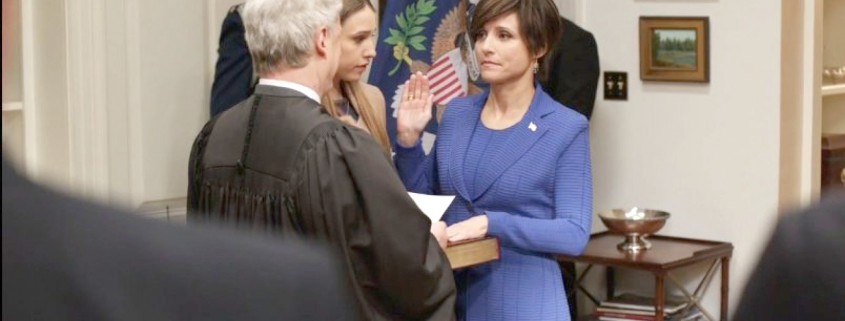HBO hit is one of most important, topical shows on TV
Sunday, April 12 2015 was notable for two different (yet eerily similar) events; however, depending on how you look at them or who you are, they could both easily be considered equally monumental for women at large. The events I am talking about are, first: Hillary Clinton’s announcement to run for the presidential office in 2016, and second: the premiere of the fourth season of HBO’s comedy Veep starring Julia Louis-Dreyfus.
Clinton’s announcement, although no surprise, still marks an important monument in history where a woman hopes to become the first woman in the Oval Office. Though not her first campaign, the anticipation for Clinton’s announcement could be considered palpable, with both Hollywood and D.C. heavy-hitters (such as Lena Dunham and Barbara Boxer, respectively) taking to Twitter to publicly support Clinton’s campaign. On the flipside in Veep’s television fictional universe, Dreyfus’ character Selina Meyers has just become the first female president of the United States.
It’s clear that the Veep- — the premise of which was born out the Sarah Palin-era of mockery that explored the ineptitude of vice presidents — has taken a life of its own. In the season premiere, Selina Meyers has been promoted from vice president to president after her male predecessor resigned in the shocking last season finale. While the previous three seasons were marred by not only an ineptitude of those surrounding Meyers, but also Meyers’ crass and immoral nature, season four seems to be making new ground for both the show and its star. Now as the president, Meyers has a newfound assuredness, occupying the oval office with a certain swagger in a navy zippered pencil skirt as she flits from countless meeting to meeting. At one point, Meyers says with a gleeful smile, “Yeah, cause I’m the president, see. Everything’s my fault now.” Earlier in the episode, as she shakes hands excitedly prior to her first joint session, she says, “We’re making history.” Seconds later, as one cabinet member shakes a little too vigorously, Meyers utters: ”Ow, you’re hurting my hand,” not simply for comedic effect but to underscore her delicate yet affirmed position as the first ever woman in the White House who is ready to take charge.
Furthermore, those closest to her in the White House accept her status change with excitement and ease. At one point her press secretary exclaims, “That was the actual president of the United States! She calls me Mike.” Others easily transition as well—the term “Madame President” rings out multiple times throughout the show. Some characters even go so far as to correct certain phrases to make way for the gender change, for instance the White House’s poll crunching guy Kent Davison (Gary Cole) — who played the clear antagonist to the Veep in previous seasons — now offers Meyers deep respect and admiration and at one point (after Meyers has made an executive decision) tells her, “That was masterly, ma’am. Or mistress-ly, whichever isn’t offensive.”
Later, right before a group of military men are set with Meyers for a meeting to work over some numbers in the country’s budget, one of her staff members warns her to be wary of the men’s masculine negotiating tactics. Meyers responds assuredly and with a laugh, stating, “What are you talking about? I’m used to dealing with angry, aggressive, dysfunctional men. i.e.: men.” This furthers the show’s agenda for promoting Selina’s new status as a capable and ball-busting woman in office.
Of course, that isn’t to say Meyer’s new position in the White House doesn’t happen without its hitches — the entire premise of the show would be thrown out the window if that were true. Instead, Meyers’ new role is used as a way to raise the stakes within the show. Furthermore, those around Meyers in the season premiere are still as incapable as ever, but juxtaposed with Meyers’ newfound power the mistakes pave way for more comedy gold than ever before. At the end of the episode — after Meyers has just announced she would fund $10 billion more to a project she wanted to scrap earlier simply because her right-hand people found they couldn’t edit the teleprompter in time — Meyers stands in the oval office and faces her staff. After hearing their pitiful but heartfelt excuses, Meyers orders every person out of the office. And because she’s the president, they do just that.
When contrasted with other comedic shows that feature female protagonists on television — such as New Girl or The Mindy Project or even HBO’s “progressive” Girls — Veep, no matter their mix-ups and tragedies, features a woman in the highest position of power possible. In terms of real life, Hillary Clinton herself is undoubtedly familiar with both the campaign trail and the White House itself, but maybe those personally unaffiliated with Washington, D.C. — i.e. audience members and future voters in 2016 who consume media at rapid-fire pace — should prepare for a woman in office by turning to HBO’s Veep, and seeing how exceptionally well a woman fits into the White House after all, mistakes and all.
Minnie Schedeen is a sophomore majoring in critical studies. Her column, “Film Fatale,” runs every other Tuesday.

